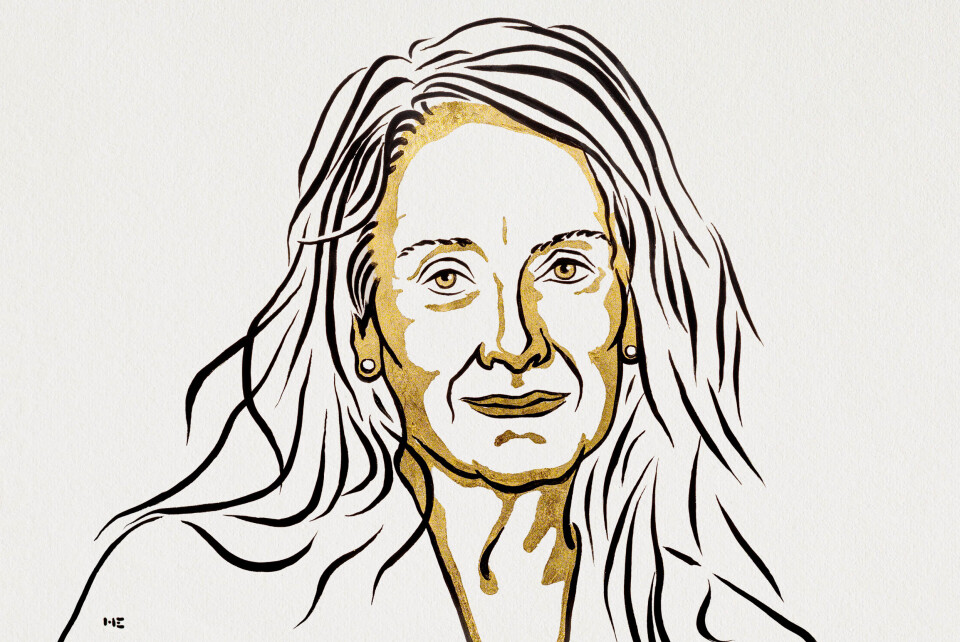-
I moved to France for the cake – and then learned to love British baking
Columnist Sarah Henshaw rediscovers the British baking tradition of comfort, jam and just having a go
-
Is it time to shorten France's school holidays?
Pascal Bressoux, professor of educational sciences at the University of Grenoble Alpes, explains why the school timetables need a rethink
-
Savoyards poke fun at Parisians over snow disruption
A few centimetres shut down capital but for those in Savoie ‘it’s time to clear the chalet steps so no one slips after an apero’
How reading Annie Ernaux will help you understand France
The French author has just been awarded the Nobel Prize for literature, having been commended for the unflinching gaze with which she beholds French society

French author Annie Ernaux has won the 2022 Nobel Prize for literature, the Swedish Academy announced today (October 6).
“Her work is uncompromising and written in plain language, scraped clean,” said Anders Olsson, Chairman of the Nobel Committee.
BREAKING NEWS:
— The Nobel Prize (@NobelPrize) October 6, 2022
The 2022 #NobelPrize in Literature is awarded to the French author Annie Ernaux “for the courage and clinical acuity with which she uncovers the roots, estrangements and collective restraints of personal memory.” pic.twitter.com/D9yAvki1LL
“And when she with great courage and clinical acuity reveals the agony of the experience of class, describing shame, humiliation, jealousy or inability to see who you are, she has achieved something admirable and enduring.”
For those interested in France, to read Ernaux’s work is to witness the country’s social, economic and political development through the second half of the twentieth century and the early twenty-first century.
Fiction combined with autobiographical details
Born on September 1, 1940, in Yvetot in Normandy, Ernaux is known for her novels combining fiction with autobiographical details.
In particular, her novel Les Années (The Years), which was published in France in 2008 but was not translated into English until a decade later, has been referred to as a “collective autobiography”.
It traces the period from the 1940s until 2006, through personal memories as well as the collective consciousness of the country – from the children who grew bored listening to their parents’ stories of World War Two, to the Algerian War, May ‘68, and Nicolas Sarkozy’s promise to rid impoverished Paris suburbs of “scum”.
The novel is told in a breathless style, constructed around photos, TV shows, adverts, and objects which all build the impression that the personal and the political, the individual and the collective, are intertwined.
Through the story of one woman, she captured a whole era. Or, rather, several.
At a time when reproductive rights are under threat around the world, not least in the United States, it is another deeply personal novel, published in 2000, which seems the most timely, however.
This year’s #NobelPrize laureate in literature Annie Ernaux has said that writing is a political act, opening our eyes for social inequality. For this purpose she uses language as “a knife”, as she calls it, to tear apart the veils of imagination. pic.twitter.com/TQm6rxjvMp
— The Nobel Prize (@NobelPrize) October 6, 2022
‘Ruthlessly honest’
L'Événement (Happening) tells the story of the author’s illegal abortion in 1964, 11 years before the Loi Veil legalised terminations.
“It is a ruthlessly honest text, where in parentheses she adds reflexions in a vitally lucid voice, addressing herself and the reader in one and the same flow,” Olsson said.
"She is a wonderful writer and she has really renewed literature in many ways."
— The Nobel Prize (@NobelPrize) October 6, 2022
Immediately after the announcement, Anders Olsson, Chairman of the Nobel Committee, was interviewed by Carin Klaesson regarding the 2022 Nobel Prize in Literature.
Watch the full interview: pic.twitter.com/aA2emWuotx
The novel was adapted into a film of the same name, which won the Golden Lion at the Venice Film Festival in 2021.
Much of Ernaux’s work similarly explores her place in relation to wider French society.
In 1983, she published another autobiographical novel, La Place (A man's place), which examines the period in her life when, two months after she passed her teaching exams, her father died.
It is in La Place that she most keenly observes her own transition from the daughter of manual labourers who later ran a small café and corner shop, to becoming a French teacher and having to adapt to the codes of bourgeois society.
Since then, she has never ceased deconstructing the class prejudice and sexism she so often experienced.
Earlier this year, she came out publicly in support of Jean-Luc Mélenchon ahead of the presidential election.
Ernaux is the 16th French writer to win the Nobel, and the first since Patrick Modiano in 2014. She is just the 17th woman to win the prize, which has been awarded to 119 writers, and the first French woman to receive the honour.
Read more
Exhibit celebrates French illustrator Albert Dubout’s eye for satire
My photos of 'Swinging Sixties' spark memories in French care homes
Jules Verne: the hidden story of France’s first science fiction writer
























